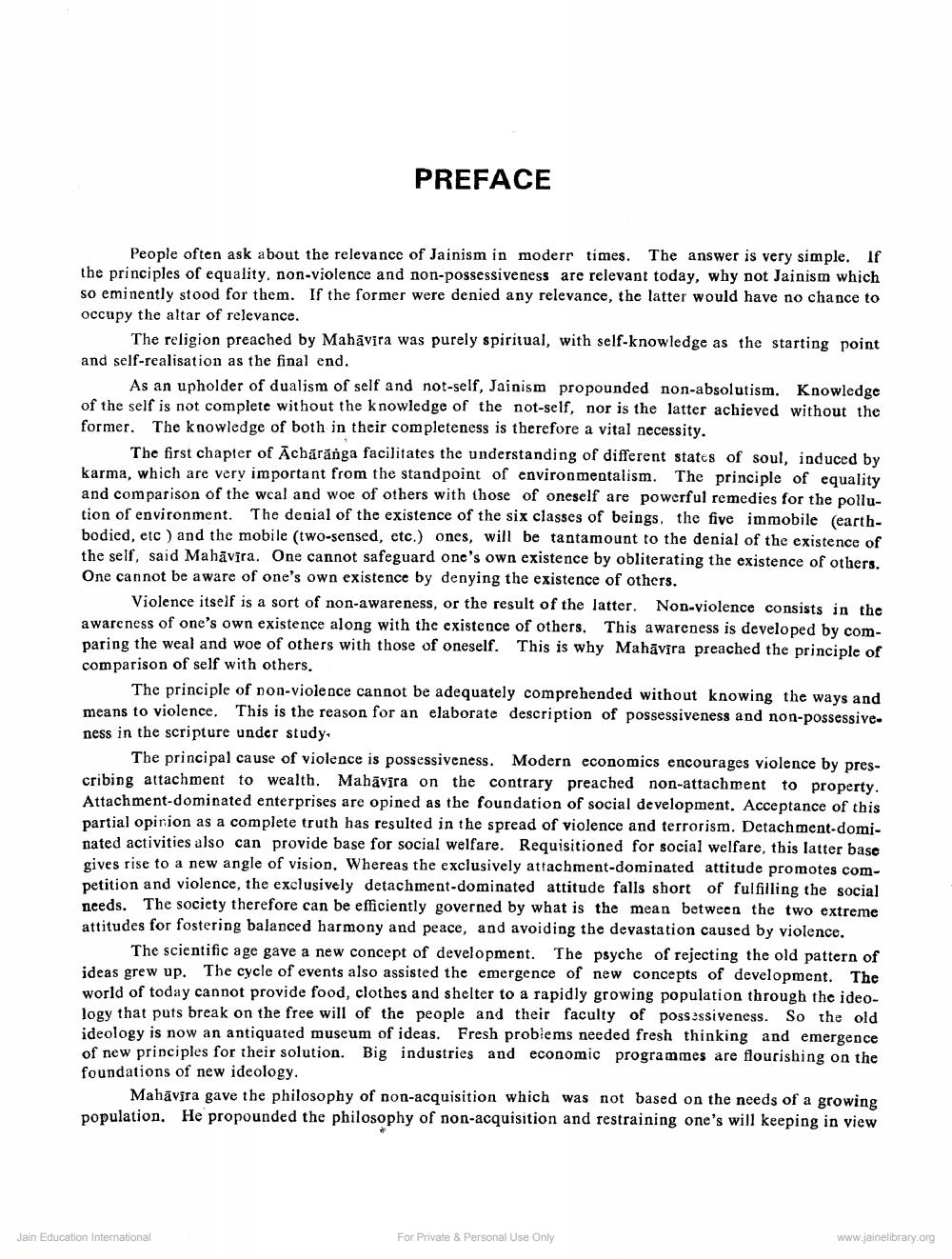________________
PREFACE
People often ask about the relevance of Jainism in moderr times. The answer is very simple. If the principles of equality, non-violence and non-possessiveness are relevant today, why not Jainism which so eminently stood for them. If the former were denied any relevance, the latter would have no chance to occupy the altar of relevance.
The religion preached by Mahāvira was purely spiritual, with self-knowledge as the starting point and self-realisation as the final end.
As an upholder of dualism of self and not-self, Jainism propounded non-absolutism. Knowledge of the self is not complete without the knowledge of the not-self, nor is the latter achieved without the former. The knowledge of both in their completeness is therefore a vital necessity.
The first chapter of Āchárānga facilitates the understanding of different states of soul, induced by karma, which are very important from the standpoint of environmentalism. The principle of equality and comparison of the wcal and woe of others with those of oneself are powerful remedies for the pollution of environment. The denial of the existence of the six classes of beings, the five immobile (earthbodied, etc) and the mobile (two-sensed, etc.) ones, will be tantamount to the denial of the existence of the self, said Mahāvīra. One cannot safeguard one's own existence by obliterating the existence of others. One cannot be aware of one's own existence by denying the existence of others.
Violence itself is a sort of non-awareness, or the result of the latter. Non-violence consists in the awareness of one's own existence along with the existence of others. This awareness is developed by comparing the weal and woe of others with those of oneself. This is why Mahāvīra preached the principle of comparison of self with others.
The principle of non-violence cannot be adequately comprehended without knowing the ways and means to violence. This is the reason for an elaborate description of possessiveness and non-possessive. ness in the scripture under study,
The principal cause of violence is possessiveness. Modern economics encourages violence by prescribing attachment to wealth. Mahāvīra on the contrary preached non-attachment to property. Attachment-dominated enterprises are opined as the foundation of social development. Acceptance of this partial opinion as a complete truth has resulted in the spread of violence and terrorism. Detachment-dominated activities also can provide base for social welfare. Requisitioned for social welfare, this latter base gives rise to a new angle of vision, whereas the exclusively attachment-dominated attitude promotes competition and violence, the exclusively detachment-dominated attitude falls short of fulfilling the social needs. The society therefore can be efficiently governed by what is the mean between the two extreme attitudes for fostering balanced harmony and peace, and avoiding the devastation caused by violence.
The scientific age gave a new concept of development. The psyche of rejecting the old pattern of ideas grew up. The cycle of events also assisted the emergence of new concepts of development. The world of today cannot provide food, clothes and shelter to a rapidly growing population through the ideology that puts break on the free will of the people and their faculty of possessiveness. So the old ideology is now an antiquated museum of ideas. Fresh problems needed fresh thinking and emergence of new principles for their solution. Big industries and economic programmes are flourishing on the foundations of new ideology.
Mahāvīra gave the philosophy of non-acquisition which was not based on the needs of a growing population. He propounded the philosophy of non-acquisition and restraining one's will keeping in view
Jain Education International
For Private & Personal Use Only
www.jainelibrary.org




